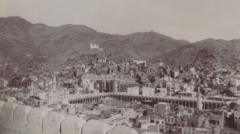

As the annual Hajj pilgrimage concludes, an old dispute simmers thousands of miles away in India, concerning a once-grand guest house in Mecca. This is the story of Keyi Rubath, a 19th-century building constructed in the 1870s by Mayankutty Keyi, an Indian merchant from Malabar, Kerala. His trading empire stretched from Mumbai to Paris, and Keyi Rubath, located near Masjid al-Haram, Islam's holiest site, was a testament to his success.
The guest house served as a haven for Indian pilgrims for decades. Family lore describes a building with 22 rooms and several halls spread over 1.5 acres, just steps from the Grand Mosque. Keyi purportedly used wood shipped from Malabar for its construction. It was more than just a place to stay; it was a cultural touchstone, offering familiarity and comfort in a foreign land.
However, the winds of change swept through Mecca. In 1971, as part of a massive expansion project around the Grand Mosque, Keyi Rubath was demolished. Saudi authorities, acknowledging the loss, deposited 1.4 million riyals (approximately $373,000 today) as compensation in the kingdom's treasury. The problem? They could not identify the rightful heir at the time.
This is where the "intrigue" begins. The compensation, untouched for decades, has become the subject of a bitter inheritance battle between two branches of the Keyi family. Each is trying to prove their lineage to claim what they believe is rightfully theirs. So far, neither has succeeded. The sum, still held in Saudi Arabia, has also sparked speculation, with some family members claiming it could be worth over $1 billion today, adjusted for inflation.
Adding another layer of complexity, the property was a waqf – an Islamic charitable endowment. This means that while descendants can manage the property, they cannot own it outright. This detail raises questions about the nature of the compensation and who is entitled to it. The Saudi department that handles Awqaf (endowed properties) has not commented on the matter, and the Saudi government has remained publicly silent, fueling further speculation.
Successive Indian governments, both at the national level and in Kerala, have attempted to mediate and resolve the deadlock. The case highlights the complexities of international property disputes, particularly those involving religious endowments and historical claims. It also underscores the deep connection between Indian Muslims and the holy city of Mecca, a connection that transcends generations and even the boundaries of time. While the legal and financial aspects remain tangled, the story of Keyi Rubath serves as a reminder of the rich history and cultural exchange facilitated by the Hajj pilgrimage. The guest house may be gone, but the legacy and the debate over its compensation continue to resonate.